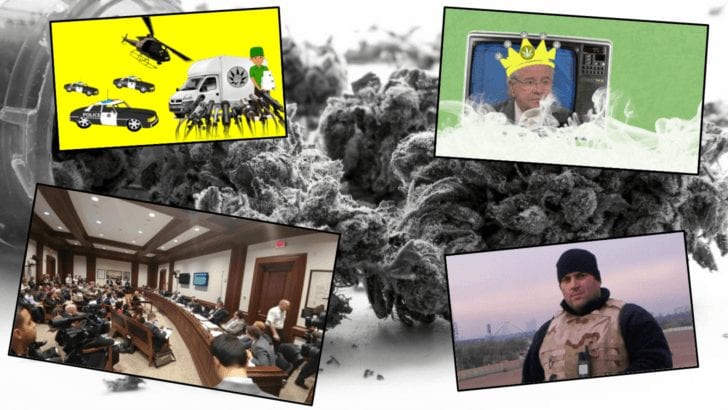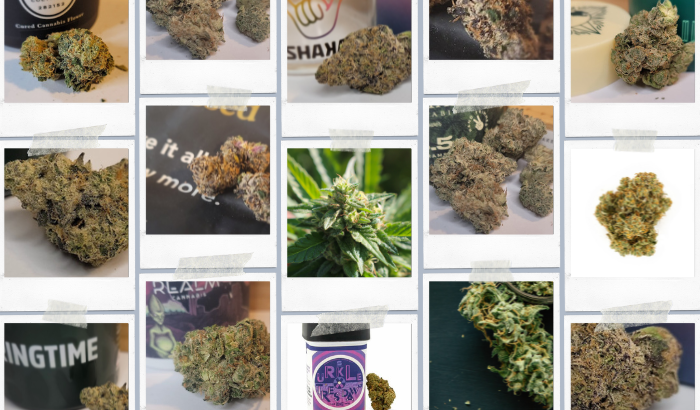
As expected, the struggle continues in the recreational era
You might think that after the ignoring of voters and advocates by politicians for decades, a November 2016 ballot initiative that legalized marijuana—against the wishes of most elected officials in Massachusetts—would ring in a 2017 that was glorious for local reformers. But that’s just not how things work around here.
Instead, the longstanding cannabis community was made to battle reefer-mad power brokers at every turn. As predicted by many, 2017 simply marked the beginning of a longer campaign after the prior year’s victory, an endless political war over recreational cannabis policy in the Commonwealth.
Let’s take a look back at how this all unfolded…
In January, DigBoston was one of just a few outlets to report that an unchecked Massachusetts Board of Registration in Medicine (BORIM) was refusing to reinstate the medical license of Dr. John Nadolny. Along with Mass Gov. Charlie Baker, BORIM became tangled in a sad political play against cannabis, a game that was exposed after an appeals judge ruled that Nadolny’s license should have never even been suspended in the first place. In their role, the Boston media was worse than complicit, with outlets including FOX 25 (which has since changed its name to BOSTON 25) gleefully reporting on the unlawful suspension.
On Beacon Hill, in February we reported about Bob DeLeo and his sham committee for cannabis, which was stacked with losing prohibitionists wishing to invalidate the new law that a majority of voters pulled for.
In April, we turned to the human side, anchoring our 4-20 issue with a feature about local veterans advocate Stephen Mandile, who discussed his lobbying push against those same prohibitionists. Mandile also enlightened us about topics like the use of cannabis to combat opiate abuse, as well as the initiative by veterans and others to grow marijuana cooperatively.
Also in April, we reported the rift in the medical cannabis community over the lack of delivery services and the fact that a leading patients group was pushing for the shutdown of gray market providers who were filling in the void.
In May, we reported that the founder/CEO of Canna Care Docs (a sponsor of my WEMF Radio show, The Young Jurks), Kevin Kafka, challenged existing dispensaries to offer more support for veterans and other at-risk patient populations. Kafka stated, “One of our core principles … is to ensure that no patient should stay in the black market for just financial reasons, and that principle has served us and [the patient] population very well.”
A short time later, some local dispensaries did begin offering rebates to new patients to cover the cost of their medical marijuana cards, as well as new discounts for veterans. At least one dispensary trotted out a new statewide delivery service (with a hefty fee, of course, but progress nonetheless).
In a June interview, State Sen. Patricia Jehlen backed the cannabis community, telling us she was ready to fight against the rewrite of the new cannabis legalization law: “My principles were: 1—To respect the will of the voters and; 2—To drive people [away] from the illegal market [and] into the legal market and; 3—To see what we can do to remedy the damage done to communities by the war on drugs.”
Toward the end of June, as lawmakers worked to dismantle the cannabis bill passed by voters, my team from The Young Jurks protested outside of House Speaker Bob DeLeo’s home in Winthrop. We expected some possible pushback, but we weren’t expecting it to come from MassCann/NORML.
Yet that’s exactly what happened.
The result? DeLeo got a higher tax, made it easier for some local cities and towns to opt out of retail sales, and gutted the expungement for past cannabis crimes. But still the community was at least partially heard, as reformers like Jehlen fought hard to ensure that co-ops and inclusion for communities harmed by the war on drugs were included in the final compromise.
And it was no wonder that, as local reform leaders of color—including but not limited to Shaleen Title (a co-author of the legalization initiative that’s since been named to the state’s Cannabis Control Commission (CCC)), Shanel Lindsay, Sonia Espinosa, Joseph Gilmour, and Kamani Jefferson—were plugged directly into the conversation, the communities they represent were heard at public hearings and beyond. Furthermore, veterans like Mandile and the others, representing other marginalized communities through the newly founded Massachusetts Cannabis Consumers Council, became a critical source of information for media and lawmakers alike.
In September, the town of Milford voted to ban rec cannabis shops, becoming the first to do so under the new law. Other municipalities followed to different degrees, while voters in some places—Salem, Amesbury, and Newbury—said no to bans and yes to moving forward on shops. In Amesbury, a local native of the city, Scott Winters, led a coalition to a landslide victory over the ban.
In October, Boston City Councilor Tito Jackson made cannabis policy an issue in his losing bid for mayor against incumbent Martin Walsh.
Later that month, New England Treatment Access, a registered medical dispensary in Massachusetts, stepped in it by submitting a memo, through law firm Foley Hoag, to the state’s newly formed CCC advocating to give registered medical dispensaries a head start on recreational licensing, and to put co-ops and craft cannabis programs on the back burner. The community wanted none of that and came out in droves to testify that co-ops and inclusion programs should become a priority.
In December, the CCC held public hearings to decide priorities and to create draft regulations for the industry. Title, who seemed to be leading the way with positive news, reported on social media:
Just presented proposed regulations licensing cannabis cafes and businesses (yoga studios, movie theaters, etc) that allow cannabis use. Passed unanimously.Presenting statewide equity program tomorrow….
The following day, measures were voted down, 4-to-1, that would have advanced programs that can create equity for populations that have been harmed by prohibition. Specifically, there will be no bring your own cannabis licensing, single-day consumption licenses, or delivery-only licenses.
One step forward, two steps back.
MRCC, meanwhile, has created a petition to ask the CCC to reconsider its decision.
On the personal side, a major loss was the death of activist/entrepreneur Mickey Martin on June 20. Martin helped open the now-shuttered Northeastern Institute of Cannabis, while the nonprofit that he also helped found, Parents 4 Pot, is currently gathering funds and presents for children of parents jailed for cannabis offenses (the struggle doesn’t end just because Christmas is over).
And in more bad news to end December on, last week it was reported that the two co-founders of Mass Genetics, local legends and High Times Cannabis Cup winners, were raided by the DEA and are being charged in federal court.
What a year for legal weed it’s been.

























